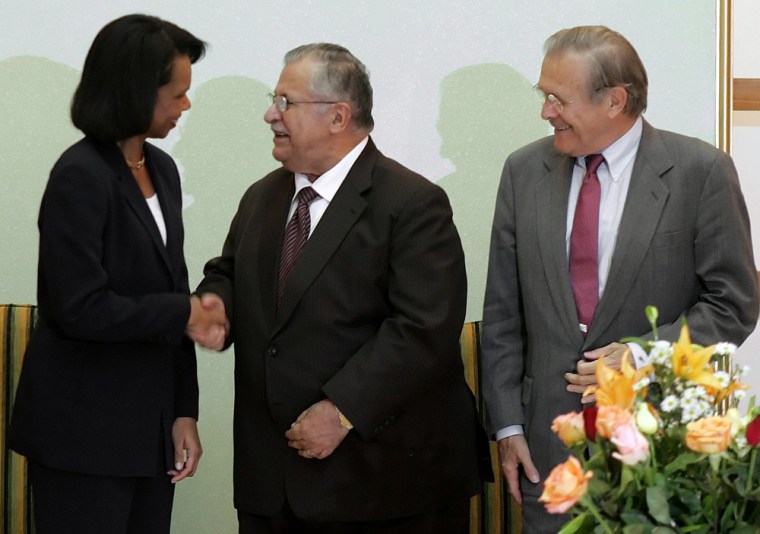President Bush’s top two national security officials made a surprise visit to Iraq Wednesday, showing support for the emerging government as the top U.S. military commander there said some U.S. troops may be able to leave in the months ahead.
Army Gen. George Casey said Iraq’s selection of top government leaders marked a major step toward creating conditions that could allow a partial withdrawal.
“I’m still on my general timeline,” Casey told reporters after meeting with Defense Secretary Donald H. Rumsfeld, who arrived unannounced for a daylong series of meetings with top U.S. commanders and the newly selected Iraqi leaders.
Secretary of State Condoleezza Rice flew separately in from Turkey a few hours later to shore up the U.S. show of support.
“We just want to make sure there are no seams between what we’re doing politically and what we’re doing militarily,” Rice told reporters on her plane en route to Iraq. “Secretary Rumsfeld and I are going to be there together because a lot of the work that has to be done is at that juncture between political and military.”
Meetings with new PM
She and Rumsfeld huddled with the U.S. ambassador and other top U.S. military and civilian officials for lunch and then planned to meet jointly with the newly designated prime minister.
Rice scheduled a separate one-on-one meeting with him later.
Casey did not elaborate on his timeline for reducing U.S. forces, but he has said in the past that a “fairly substantial” reduction could be made this year if the insurgency did not grow worse and if Iraq made continued progress on the political and security training fronts.
Asked whether the breakthrough agreements last weekend to name Jawad al-Maliki as prime minister and to fill six other top government posts moves U.S. officials closer to implementing the expected troop reductions this year, Casey replied, “It certainly is a major step in the process.”
He added that more needs to be accomplished on the political side, particularly in filling key government ministry jobs.
U.S. troop reductions?
The Pentagon has not said when it expects to make decisions about further troop reductions. Casey had said late last year that he expected to submit his recommendation this spring.
“We are seeing the situation a little clearer, I’d say,” as a result of the latest political progress, Casey said. “And the clearer I see it the better I can make my recommendations.”
Rumsfeld, who appeared with Casey before reporters, said one of the subjects they had discussed was engaging the emerging Iraqi government in talks on the future of military bases and the division of security responsibilities between American and Iraqi troops.
“There is no question but that as the new government is formed and the ministers are in place, that it’s appropriate for us to begin discussions with the new government about the conditions on the ground and the pace at which we’ll be able to turn over responsibility in the provinces,” Rumsfeld said.
Rumsfeld said the United Nations Security Council resolution that forms the legal basis for U.S. operations to stabilize and rebuild Iraq is to expire at the end of the year so there will have to be talks with the Iraqi government on arrangements beyond this year.
Rumsfeld stays the course
Alluding to recent calls by several retired generals for Rumsfeld to resign, a reporter asked the 73-year-old defense secretary whether this visit — his 12th — would be his last trip to Iraq as Pentagon chief.
He replied with one word, and no smile: “No.”
U.S. officials have made clear their concern that the emerging Iraqi government place a high priority on disarming or otherwise controlling armed militias that are accused of sectarian violence.
Lt. Gen. Peter Chiarelli, the second-ranking U.S. general in Iraq, said in an interview with a small group of reporters that militias are an urgent threat to the country’s stability.
“That to me is an issue we’ve got to get fixed,” Chiarelli said.
Casey had said last year that if the insurgency did not worsen and the Iraqis remained on track toward establishing a government of national unity, then fairly substantial reductions in the U.S. troop presence were likely this spring and summer. So far, the total has been reduced only slightly, from about 138,000 to about 132,500 and no further cuts have been announced.
Encouragement from Bush
Rumsfeld’s press secretary, Eric Ruff, told reporters aboard the defense secretary’s overnight flight from Washington that Rumsfeld’s trip was designed to convey Bush’s encouragement at the latest steps toward putting in place Iraq’s first fully constitutional government since the fall of the Saddam Hussein regime three years ago.
“The president asked us to go and show support for their new government,” Ruff said.
In a break from past practice, Rumsfeld did not speak to reporters traveling with him on the 13-hour flight to Baghdad. Before he left Washington he met behind closed doors with Senate Majority Leader Bill Frist, R-Tenn., and about 15 other Republican members of the Senate to discuss the administration’s $72 billion supplementary budget request, Ruff said.
In an interview Monday with the Pentagon Channel, a television channel whose main audience is military members at home and abroad, Rumsfeld said he expected the insurgency to keep up the violence and try to stop the new political leadership in Baghdad from filling key ministry jobs with competent, nonsectarian officials.
Rumsfeld’s visit to Iraq coincides not only with important progress on the political front in Baghdad but also with a recent surge in American casualties, which are on pace this month to hit the highest total since last November, when 84 U.S. troops died in Iraq.
The rise in U.S. deaths comes even as the Iraqi security forces are given more of a lead role in battling the insurgency, with the Americans in support. It has been hoped that this shift of responsibilities would lead to fewer U.S. casualties.
